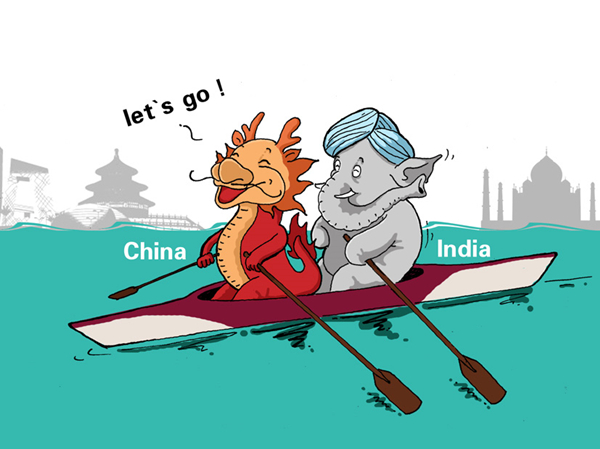Boycotting Chinese products doesn't help India
- By Rabi Sankar Bosu
 0 Comment(s)
0 Comment(s) Print
Print E-mail China.org.cn, August 15, 2017
E-mail China.org.cn, August 15, 2017
|
|
|
In the same boat [By Zhai Haijun / China.org.cn] |
Amidst the continuing standoff between Indian and Chinese soldiers in the Doklam area of Sikkim for more than two months, a determined national campaign to boycott Chinese goods has been gathering ground.
It is being led by several ultra-nationalist Indian politicians of the ruling Bhartiya Janata Party (BJP), as well as some Indian right-wing Hindu nationalist organizations such as Vishwa Hindu Parishad, Rashtriya Swayamsevak Sangh (RSS).
The boycott chorus against Chinese products is a frog-in-the-well kind of perspective that cannot help India, but rather negatively affect the interest of Chinese enterprises to invest in India as well as overall bilateral cooperation.
In the state executive committee meeting of the BJP party on Aug. 7, Karnataka General Secretary and parliamentarian Shobha Karandlaje called on the public to boycott Chinese goods such as toys and consumer durables. She said the party "will create awareness among the people about the problems caused by China at the border and the need to boycott Chinese goods."
Yoga guru Baba Ramdev, on August 5, urged the people to boycott Chinese products as part of a drive to stir up the flames of Hindu nationalism. The shrill call for boycott is getting louder, with social media networks amplifying the clamor.
In the past two years, various Indian right-wing organizations have urged a boycott "to teach China a lesson for creating trouble on the border." They alleged that China failed to end the deadlock over the listing as a global terrorist of Pakistan-based Jaish-e-Mohammad chief Masood Azhar and China's continued opposition to India's membership of the elite Nuclear Suppliers Group (NSG).
The boycott decision by BJP leaders and workers is an unwise and infantile call because it cannot succeed. It will not help reduce India's trade deficit with China but could damage India-China bilateral ties instead. By boycotting Chinese goods or not using China's products, India will hamper its economy more than China's economy along the lines of "digging one's own grave."
Patriotism and trade are two different things and should never mix. Banning or boycotting Chinese products harms India economically, politically and strategically.
China is the world's largest trading nation, with exports in 2015 of $2,276.5 billion. Exports to India represented only about 2.7 percent of China's total export volume last year, but China accounted for 16 percent of India's total imports, according to data from India's Ministry of Commerce and Industry.
In the past two years since President Xi's visit, Chinese investment has been enhanced. For example, U.S.$2.3 billion flowed in during the past three months of this year, compared with only U.S.$1.35 billion between 2000 and 2016. Chinese companies are strong participants in the government's "Made in India" campaign, with total investment of U.S.$5 billion so far.
Chinese dominance is a reality in markets, in economy and in trade. Over 500 Chinese companies now operate in India, and, over the years, Chinese products have dominated the Indian market and can be seen in every living room in India.
Indian consumers have higher expectations of Chinese goods. A recent survey published in the Hindustan Times, suggested that 83 percent of the public prefer Chinese goods over Indian ones "as they believe they are cheaper and that Indian goods are quite expensive."
Each year during the festive season of Dussehra , Diwali, Christmas and New Year, Chinese products including decorative lights and lamps, gift items and firecrackers are widely sold across India. Boycotting Chinese goods will mainly hurt Indian traders who handle the goods. In addition, the economy will suffer as an important source of tax for the government will be lost.
It should be noted here that Chinese goods have also helped to keep prices low in the Indian market, thereby helping Indian poor. There is no doubt that Chinese products not only lowered India's inflation rate but also met the daily needs of ordinary people, especially the low-income ones, and greatly improved their life quality.
Talking about the bilateral trade relations, Chinese Consul General in Kolkata Ma Zhanwu has rightly said, "The China-India trade is mutually beneficial. Boycotting Chinese goods may hurt Indian consumers as well. If so, no one is going to win."
To sum up, it can be said that, with its weaker economy, India's boycott of Chinese goods makes no sense. Moreover, the call of boycotting Chinese-made products is not a solution to the border standoff.
Such type of "dangerous nationalistic" call is totally illogical and unexplainable under WTO rules. Indian nationalistic politicians should realize bans or boycotts can only slow progress in bilateral relations.
Rabi Sankar Bosu, secretary of New Horizon Radio Listeners' Club, West Bengal, India
Opinion articles reflect the views of their authors only, not necessarily those of China.org.cn.







Go to Forum >>0 Comment(s)